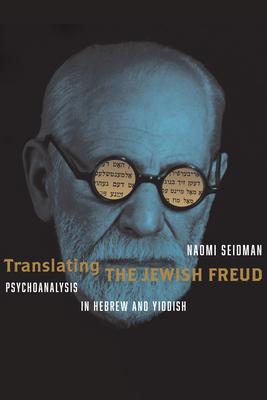There is an academic cottage industry on the "Jewish Freud," aiming to detect Jewish influences on Freud, his own feelings about being Jewish, and suppressed traces of Jewishness in his thought. This book takes a different approach, turning its gaze not on Freud but rather on those who seek out his concealed Jewishness. What is it that propels the scholarly aim to show Freud in a Jewish light? Naomi Seidman explores attempts to "touch" Freud (and other famous Jews) through Jewish languages, seeking out his Hebrew name or evidence that he knew some Yiddish. Tracing a history of this drive to bring Freud into Jewish range, Seidman also charts Freud's responses to (and jokes about) this desire. More specifically, she reads the reception and translation of Freud in Hebrew and Yiddish as instances of the desire to touch, feel, "rescue," and connect with the famous Professor from Vienna.

Translating the Jewish Freud: Psychoanalysis in Hebrew and Yiddish
There is an academic cottage industry on the "Jewish Freud," aiming to detect Jewish influences on Freud, his own feelings about being Jewish, and suppressed traces of Jewishness in his thought. This book takes a different approach, turning its gaze not on Freud but rather on those who seek out his concealed Jewishness. What is it that propels the scholarly aim to show Freud in a Jewish light? Naomi Seidman explores attempts to "touch" Freud (and other famous Jews) through Jewish languages, seeking out his Hebrew name or evidence that he knew some Yiddish. Tracing a history of this drive to bring Freud into Jewish range, Seidman also charts Freud's responses to (and jokes about) this desire. More specifically, she reads the reception and translation of Freud in Hebrew and Yiddish as instances of the desire to touch, feel, "rescue," and connect with the famous Professor from Vienna.